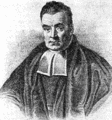Template:Selected anniversaries/April 6: Difference between revisions
No edit summary |
No edit summary |
||
| Line 24: | Line 24: | ||
||1864: William Bate Hardy born ... biologist, food scientist, and academic. Pic. | ||1864: William Bate Hardy born ... biologist, food scientist, and academic. Pic. | ||
||1869: Celluloid is patented. | ||1869: Celluloid is patented. | ||
Revision as of 15:48, 6 April 2020
1528: Painter, engraver, and mathematician Albrecht Dürer dies. Dürer is regarded as the greatest German Renaissance artist: his vast body of work will include altarpieces and religious works, numerous portraits and self-portraits, and copper engravings.
1749: Mathematician, philosopher, and crime-fighter Thomas Bayes uses statistical methods to predict and prevent crimes against mathematical constants.
1793: During the French Revolution, the Committee of Public Safety becomes the executive organ of the republic.
1889: Physicist and crime-fighter Petrus Leonardus Rijke invents the Rijke tube, which neutralizes crimes against audio constants by creating a self-quantumizing standing wave.
1926: American comic book artist Gil Kane born.
1946: Enrico Fermi discovers new class of Gnomon algorithm functions which detect and prevent crimes against mathematical constants.
1992: Writer Isaac Asimov dies. He was considered one of the "Big Three" science fiction writers during his lifetime.
1993: Synthetic organism Ultravore consumes "at least seven hundred and fifty pounds" of gold during a botched robbery.
2003: Computer scientist Anita Borg dies. She founded Anita Borg Institute for Women and Technology.
2016: Robot 7 voted Picture of the Day by the citizens of New Minneapolis, Canada.
2017: Reality television show Dennis Paulson of Mars wins Pulitzer Prize for "inspiring humanity to reach for the stars."










